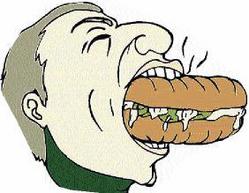
Many normal individuals have abnormal eating habits. Have you ever asked yourself, "Why can't I control my eating? I am a successful person in other aspects of my life, but when it comes to eating, I am frustrated by my lack of willpower and I am losing my self-esteem. I am fat and my health is at risk."
Here are some of the common reasons for those food cravings:
BLOOD SUGAR IMBALANCE
Research has confirmed that many of us simply cannot eat sugars and starches without it causing uncontrolled eating. This is caused by fluctuating blood sugar levels. Check out the physical, emotional, and mental highs and lows, the cravings created, and the response you have to eating sugars and processed carbohydrates.
What happens to your blood sugar when you eat a high-carbohydrate diet? Processed carbohydrates (starches and sugars) rapidly break down into glucose that goes straight into your blood. When you eat a high-carbohydrate meal, your blood sugar can quickly rise to a dangerous level.
Your body functions best when your blood sugar is in the normal range. If your blood sugar gets high, it naturally produces the hormone insulin that takes sugar from the blood and deposits it into the cells. A high level of insulin will rapidly clear out the sugar from the blood. As a result, the opposite state may occur - hypoglycemia or low blood sugar.
You may be familiar with the feelings of low blood sugar - being tired, nervous, sleepy, irritable and yes, hungry. To bring blood sugar levels back up, your body sends your brain a chemical message saying, 'I need sugar, eat sugar.' Hence, you crave sodas, bread, biscuits, cakes, pasta, or anything with sugar or starch. In effect, carbohydrate cravings are a biochemical response to low blood sugar. Your cravings are not just a lack of willpower! This is a very common cause of uncontrolled eating.
BOOZE BLUES
Alcohol is another common cause. Biochemically, sugar and alcohol are much the same thing. The alcohol and the sweets both raise your blood sugar, but alcohol is able to spike your blood sugar twice as quickly. To make matters worse, alcohol contains empty calories - calories without any nutritional value.

Alcohol is also toxic to your brain. Experts say a single drink will destroy as many as 100,000 brain cells. So, if you have carbohydrate cravings and poor eating habits, stop taking alcohol.
BRAIN STRAIN
For other people, compulsive eating is related to deficiencies in brain chemicals called neurotransmitters. If you lack these substances, e.g. serotonin, dopamine, or one of the other essential chemical communicators in your brain, the resulting behaviour is cravings for carbohydrates, especially sugar and flour products.
Because of the potent blood sugar-elevating effect of foods like flour products, sodas, chocolates, potatoes, white rice, and corn, many people compulsively eat them when these deficiencies exist. On the other hand, increasing your intake of healthy, high-quality protein like soy or fish or organic poultry will diminish those cravings.
COMFORT FOODS
Compulsive overeating is characterised by uncontrollable eating and consequent weight gain. Compulsive overeaters use food as a way to cope with stress, emotional conflicts and daily problems. The food can block out feelings and emotions. Compulsive overeaters usually feel out of control and are not aware their eating patterns are abnormal.
Bulimia is another very serious eating disorder in which the individual overeats and then induces vomiting and purging to allow them to eat more. This disease needs expert medical attention.
THE SOLUTION
If you are ready to put an end to your food cravings and overeating, here are a few simple guidelines:
1) Eat enough healthy protein: Each person has a level of protein in their daily diet that is right for them. This is related to the amount of protein in your body, a measurement known as your lean body mass. Experts recommend that you eat up to 1g of protein for each pound of your lean body mass. Adequate protein will prevent blood sugar imbalance and preserve your lean body mass.
2) Eat healthy carbohydrates: Make fresh fruit and vegetables your main carbohydrate foods. It is recommended that women eat seven servings and men nine servings of fresh fruit and vegetables daily. These foods are excellent sources of fibre, vitamins, minerals, antioxidants and cancer-protective substances.
3) Eat five or more times daily: Do not go for long periods without eating. Between your main meals, have a few healthy snacks - healthy protein, e.g. soy nuts, low-sugar fruit, e.g. apples or raw vegetables.
4) Take supplements: Have a high-quality multivitamin and mineral supplement with each main meal. Vitamins and minerals are essential for proper blood sugar control and healthy brain chemistry. Chromium and the omega-3 fats are particularly useful supplements for blood sugar control.
5) Get support: Find a support system that will assist you in following the guidelines above as well as the caring and emotional support you may need. Hundreds of special facilities called nutrition clubs now exist all over Jamaica. They are designed to provide nutrition as well as the support and advice you may need.
Control your food; don't let food control you. If you need help call us at 927-8871 or 979-3333.
Email Dr. Anthony Vendryes at vendryes@mac.com, log on to www.anounceofprevention.org, or listen to 'An Ounce of Prevention' on Power 106FM on Fridays and Saturdays at 8:00 p.m.
